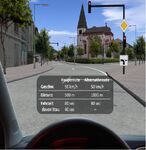
Decision Making in Navigation Tasks - Influencing Factors and Ways to Change them

The effectiveness of traffic management depends on how drivers follow central traffic information, i.e. change the route in a desired way. In order to do so, an understanding is needed, concerning the type of information used by drivers for their route choice: the decision criterions that play a role, as well as the way different evaluations are integrated. This essentially involves cognitive decision-making-processes.
Based on driving simulation studies it will be examined how driver evaluate different information and integrate them to one decision. The corresponding characteristics of routes are varied and combined to experience this in the simulated driving, as well as determine the relational meaning of the influencing factors. Thereby shall, in particular, be examined the extent to which decisions and strategies of cooperative traffic management can be communicated and integrated into the driver’s decisions.
Both, centralized (e.g. evenly distribution of traffic throughout the city) and decentralized (e.g. optimization in the area of an intersection), are considered aspects.
The results of this study will contribute to the strategies of traffic management. One the one hand, traffic management can selectively impart the relevant information, on the other hand it can take into account how drivers will behave according to the recommendations (field of research B1). Furthermore the results will also contribute to the modeling in context of multi-agent systems (B2).
Researcher: Dipl.-Psych. Madlen Ringhand
Student Research Projects
2014
Wo soll’s langgehen? Eine Online-Umfrage zur Routenwahl im Straßenverkehr (Anja Wolff)
2015
Arbeitstitel: Zeig mir den Weg! Darstellungsformen von Navigationsinformationen (Mareen Bentrup)